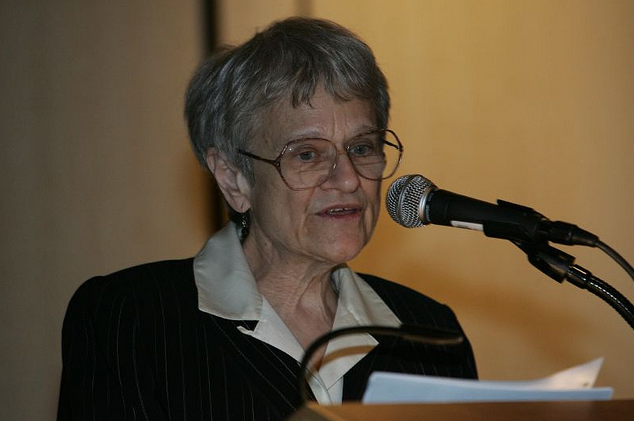Note from The Make It Safe Project team: Nancy passed away shortly after writing this post. We thank her for taking the time to write this and for all the difference she has made in the lives of queer and trans youth.
by Nancy Garden, author of Annie on My Mind
Back when I was growing up, there were no Gay-Straight Alliances, and the only people who knew the “other” meaning of the word gay were gay people and people in the arts. I sensed that I was different from other girls, but it wasn’t until I was in high school and read a magazine article about gay men that I began to realize what that difference was–and why I was falling in love with a girl in my school. Then a gay boy, a fellow apprentice at the summer theater where I worked, told me about the word gay, and we spent many hours talking about our loves and our lives.
I’d already hunted in those days for books that might help me understand what I was, but the only ones I found at first were cheap paperbacks with lurid covers and sad endings: the lesbian character usually committed suicide, was sent to a mental institution, or died in a car crash. I learned later that in order to get gay books published back then, writers had to imply or state that gay people were sick or evil and destined for tragedy.
Eventually, though, I found a helpful, old novel, The Well of Loneliness by English author Radclyffe Hall. It was honest both about what being gay actually was, and about the terrible harm that homophobia did to gay people. It, too, ended sadly, but with a heartfelt plea for justice and understanding. That made me vow to write a gay book someday that would end happily and would show that we aren’t sick, evil monsters. It took me many years, but I finally wrote Annie on My Mind.
Today’s world for LGBTQ people is very different from the world in which I grew up. But despite GSAs, organizations like GLSEN, The Trevor Project, It Gets Better, and excellent online projects like this one, it’s still far from perfect. Most of us who write for and about LGBTQ kids, get letters from young readers that make today’s remaining prejudices and barriers very clear. Those letters also say things like “Your books show me other kids go through what I’m going through,” and “Your books show me it’s okay to be who I really am.”
Books are important for all kids, but they’re especially important for LGBTQ kids, who still, even in this rapidly improving world, often feel isolated and misunderstood. That’s why books centered on LGBTQ characters are so important. Sure, most people enjoy reading about folks who are different from themselves, but also enjoy encountering fictional characters with whom they can identify directly–characters who share their backgrounds and dreams, their problems and fears, their struggles, and their triumphs over adversity. For LGBTQ kids, even in today’s world, books through which they meet people like themselves can be–and sometimes are–lifesaving.
By the way, remember that gay apprentice from long ago? He’s still one of my closest friends–and the girl I fell in love with way back then is now my legal spouse!
